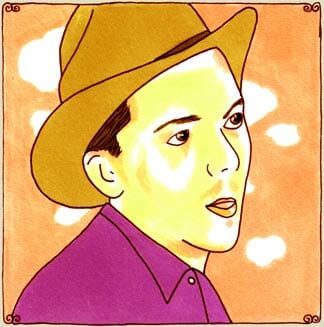- Welcome to Daytrotter
- Biscuits
- Hard Livin’
- I Don’t Care
- Lone Pine Hill
- You Can’t Leave
- Can’t Hardly Wait
Not really sure where you’re from so for us to make some sort of common connection here, it might be tough, but here it goes. Where I’m from and where most of the people I know are from, we’ve been to barn dances and weddings that actually happened in barns – both of them – and some of those weddings were held in the kinds of small, rural farm town community ballrooms that actually look like the kinds of wood-floored gems that would be slobbered over by hipster kids if they were located in downtown Chicago or New York.These were the kinds of places that hosted barnstorming tours of rock and roll bands, big bands and bluegrass greats – the Dave Clark Five, Buddy Holly, the Lawrence Welk Orchestra, Waylon Jennings – when they were cutting their teeth. Walking into them now, it’s hard to believe, but those things happened. Most of these weddings would feature a live band – mostly made up of old coots in classic country and western clothing, with bright, primary colors, tassels hanging from their shirt sleeves and knocked around cowboy boots to finish the look off – and they’d play all of the golden oldies from the Nashville canon. Without much deviation, the couple’s first dance would be waltzed to Anne Murray’s “Could I Have This Dance” – (“Could I have this dance/For the rest of my life/Will you be my partner/Every night…”) – and the rest of the song choice for the evening, as the dance floor opened up and got stickier with spilled open bar booze, continued on with that general sentimentalism.Justin Townes Earle, the son of the great Steve Earle, is just 24 years old, but he might remember receptions of the same description, where Anne Murray’s playing and there’s an air of rustic emotion and jubilee hovering around the crepe paper decorations and the people wearing their Sunday bests. He would have admired those old coots up on the stage, manning their instruments and warbling with an affected accent, but he would have spent as much time teaching other kids curse words that they never knew existed, sneaking around the illuminated bar in the corner – where all of the bottles holding contents glowed as if they were filled with different colored amounts of heaven’s elixir – for borrowed drinks and maybe even finding time to get out to the alley to drag on a pilfered Marlboro or two behind everyone’s back. The music was important to him – all of the standards and the way that the songs paced themselves and moved in that olden country way – and it is important to him (might have been a life saver) still. But he’s has to twist it, to give it a burn and a shove into a dimension that isn’t so overtly touchy-feely – that can be danced to for the first time as husband and wife, only with different overtones. It’s gotta be in a version of that renegade flavor, where the girls are breaking poor men apart, men are taking their abuses gladly and then going on the record to say that they either were going to or already had evened the score. When he was here in town, playing on a bill with David Vandervelde, he introduced “Who Am I To Say?” as being about his lady, whom he lovingly explained has been a pain in his ass for a good many years now.Love is a fight, a real tussle that has been waged always and forever and Townes Earle has been an ardent follower of the various ways that people take it and the various ways that people leave it. Love is never left the way that it was found if we’re to judge by the actions and debilitations of the characters in the young hillbilly’s genius songs about the many trials and tribulations that a guy’s going to get himself into when those chemicals get released into the system and there’s a woman involved. He finds romantic quotients in those clever turns of phrase and in the many ways that people get themselves twisted together, entrenched into lives that have to play themselves out. He twists himself just like the rest and has poured himself into the old soul body of a coot who’s been around all of the blocks one can go around. When he opens his mouth, hundreds of years come billowing out with the smoke, the wry smile and the bats.
